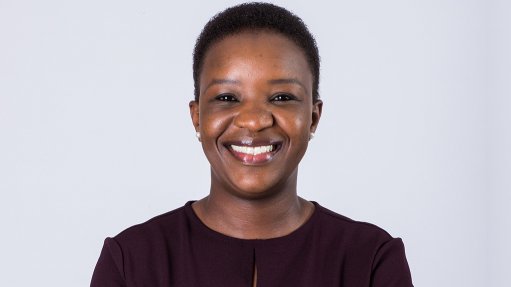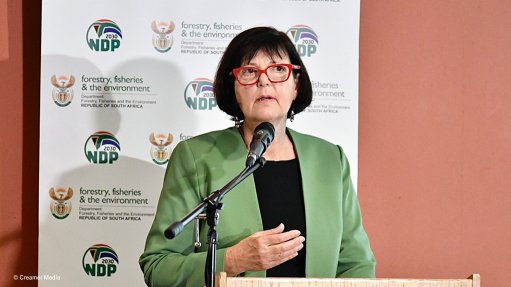Transition will be not only in energy, but in the economy as a whole
The just energy transition from fossil fuels to renewable energy that South Africa wants to pursue will also be a transition for the whole economy and presents opportunities for South Africa to address its triple challenges of unemployment, poverty and inequality, said Presidential Climate Commission head of mitigation Steve Nicholls.
"[Meaningfully impacting on the triple challenges] is at the core of the Just Transition Framework adopted by Cabinet and this thinking must now infiltrate government planning, budgeting and key performance indicators, among others, so that just transition thinking becomes an element of the economic transition," he said during an event hosted by the National Science and Technology Forum under the theme 'Transition in South Africa's Energy Provision'.
About 49% to 50% of South Africa's population lives in poverty, 33% of its adults are unemployed and unemployment among its youth is much higher.
"We have significant social problems that we need to address, and this should be at the core of the transition's goals," he said.
Further, climate change also poses real threats, including a potential 5% reduction in South Africa's gross domestic product (GDP) by 2050 linked to the impact of climate change.
Additionally, the bulk of the country's trading partners have made commitments to have net-zero economies by 2050, which is expected to see a drop off in carbon-intensive commodities and South Africa has one of the most carbon-intensive economies in the world.
"Failure to act on climate change will make our economy less competitive," he noted.
South Africa must do everything it could, within climate constraints, to ensure its economy was more competitive to create opportunities for every person in South Africa and lift people out of poverty, inequality and unemployment, he said.
Specifically, an inclusive approach to transition that involves those most affected in decision-making and taps the creative energies of all social partners is needed, alongside active support for workers and communities affected by climate mitigation-induced economic shifts and the physical impacts of climate change.
"We must use the opportunities created by the transition to structurally change the economy and put assets and resources in the hands of previously disadvantaged," Nicholls said.
The risks Africa faces from climate change include a 34% reduction in agricultural output from 2041 to 2070, and a further 25% to 75% reduction in agricultural output, depending on crop and scenario, by 2100.
South Africa faces a 5% reduction in GDP per capita by 2040 and could see a 50% drop in GDP per capita by 2100, he noted.
Further, the transition to net-zero greenhouse gas will have a different pace across different sectors.
"In global modelled pathways that limit warming to 2 °C or below, almost all electricity is supplied from zero or low-carbon sources in 2050, such as renewables, gas or fossil fuels with carbon capture and storage, combined with increased electrification of energy demand."
"The power sector is critical to the just energy transition and drives regional impacts.
"What is needed is a massive, urgent investment in renewables and in the grid, and there is a limited role for gas for peaking. Further, South Africa should invest in energy storage systems, and we need to manage the inertia and frequency of the grid. Energy efficiency measures are also critical," Nicholls said.
The power sector accounted for 60% of greenhouse gas emissions and should be the main area of focus for the country. The country should also watch for emerging technologies, and must repeat its energy planning often, he noted.
"We must strengthen the financial sector and increase our leverage of donor and international financial support. We also need to strengthen our institutions. This is a challenge, and we need to build capacity in local government to invest climate finance and achieve the potential knock-on effects," Nicholls said.
Meanwhile, similar to South Africa, ensuring energy security and availability opened up the possibility to use the energy transition to create a new economy for Africa at large, said Distributed Power Africa co-CEO Norman Moyo.
"As we fix the energy situation on the continent, we are presented with new economic opportunities and the possibility to rejig and decarbonise the economy on the continent.
"The first step is to ensure energy security and stability on the continent. The second part is to ensure the energy is affordable and the third part is that the transition decarbonises the continent's economies," he said.
"Africa is feeling the impact of climate change and must be seen to be contributing to the solution," he added.
However, there were existing opportunities that could be seized currently in the energy transition, including deploying solar and Africa had the talent in place to deploy solar systems across the continent, he highlighted.
"Whether installing such systems when building homes or on farms, we can do this with a minimum of constraints," he said.
Battery energy storage can also be deployed easily and is a part of the energy industry that is developing fast and can enable dispatchable energy.
"Transmission infrastructure would be a white elephant without electrons to move and we have an opportunity to open the ecosystem and liberalise it to allow private players to use it to wheel power.
"This is also a significant opportunity to create employment and use Africa's young talent to take us through the transition and decarbonisation journey. This will empower the young population, and the solar industry alone presents multibillion-dollar opportunities across all facets of the engineering, procurement, construction and operation supply chain."
There were also employment opportunities in doing energy audits, as there was a significant need to change old buildings and cities to become smart and energy smart, he added.
Similarly, in addition to increasing the need for engineers and electricians, there are opportunities for cleaning companies, and the drone industry to monitor assets.
However, Africa should focus on the components in the renewables value chains that it could competitively localise. There are some components that are perfect for localisation, including construction and assembly of certain technologies, such as batteries and cables, he emphasised.
"Batteries are too heavy to ship effectively, and local assembly presents huge competitive advantages. However, whether we can gain a competitive edge in producing solar panels remains to be seen, and we must consider the difference in return on ego versus a return on investment.
"We need rational thought on what components can be competitively localised and we need the conversation to remain an economic conversation and not a political one," Moyo said.
Comments
Press Office
Announcements
What's On
Subscribe to improve your user experience...
Option 1 (equivalent of R125 a month):
Receive a weekly copy of Creamer Media's Engineering News & Mining Weekly magazine
(print copy for those in South Africa and e-magazine for those outside of South Africa)
Receive daily email newsletters
Access to full search results
Access archive of magazine back copies
Access to Projects in Progress
Access to ONE Research Report of your choice in PDF format
Option 2 (equivalent of R375 a month):
All benefits from Option 1
PLUS
Access to Creamer Media's Research Channel Africa for ALL Research Reports, in PDF format, on various industrial and mining sectors
including Electricity; Water; Energy Transition; Hydrogen; Roads, Rail and Ports; Coal; Gold; Platinum; Battery Metals; etc.
Already a subscriber?
Forgotten your password?
Receive weekly copy of Creamer Media's Engineering News & Mining Weekly magazine (print copy for those in South Africa and e-magazine for those outside of South Africa)
➕
Recieve daily email newsletters
➕
Access to full search results
➕
Access archive of magazine back copies
➕
Access to Projects in Progress
➕
Access to ONE Research Report of your choice in PDF format
RESEARCH CHANNEL AFRICA
R4500 (equivalent of R375 a month)
SUBSCRIBEAll benefits from Option 1
➕
Access to Creamer Media's Research Channel Africa for ALL Research Reports on various industrial and mining sectors, in PDF format, including on:
Electricity
➕
Water
➕
Energy Transition
➕
Hydrogen
➕
Roads, Rail and Ports
➕
Coal
➕
Gold
➕
Platinum
➕
Battery Metals
➕
etc.
Receive all benefits from Option 1 or Option 2 delivered to numerous people at your company
➕
Multiple User names and Passwords for simultaneous log-ins
➕
Intranet integration access to all in your organisation


















